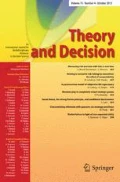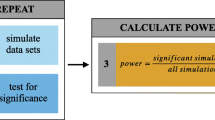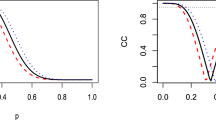Abstract
De Finetti's treatise on the theory of probability begins with the provocative statement PROBABILITY DOES NOT EXIST, meaning that probability does not exist in an objective sense. Rather, probability exists only subjectively within the minds of individuals. De Finetti defined subjective probabilities in terms of the rates at which individuals are willing to bet money on events, even though, in principle, such betting rates could depend on state-dependent marginal utility for money as well as on beliefs. Most later authors, from Savage onward, have attempted to disentangle beliefs from values by introducing hypothetical bets whose payoffs are abstract consequences that are assumed to have state-independent utility. In this paper, I argue that de Finetti was right all along: PROBABILITY, considered as a numerical measure of pure belief uncontaminated by attitudes toward money, does not exist. Rather, what exist are de Finetti's `previsions', or betting rates for money, otherwise known in the literature as `risk neutral probabilities'. But the fact that previsions are not measures of pure belief turns out not to be problematic for statistical inference, decision analysis, or economic modeling.
Similar content being viewed by others
REFERENCES
Anscombe, F.J. and Aumann, R.J. (1963), A definition of subjective probability, Annals of Mathematical Statistics 34, 199-205.
Arrow, K.J. (1964), The role of securities in the optimal allocation of risk-bearing, Quarterly Journal of Economics 31, 91-96.
Aumann, R.J. (1971), Letter to L.J. Savage. Reprinted in J. Drèze (1987).
Aumann, R.J. (1974), Subjectivity and correlation in randomized games, Journal of Mathematical Economics, 1, 67-96.
Aumann, R.J. (1987), Correlated equilibrium as an expression of Bayesian rationality, Econometrica 55, 1-18.
Cox, J. and Ross, S.A. (1976), The valuation of options for alternative stochastic processes, Journal of Financial Economics 3, 145-166.
Cuoco, D. and Zapatero, F. (2000), On the recoverability of preferences and beliefs, Review of Financial Studies 13(2), 417-432.
de Finetti, B. (1937), La prévision: ses lois logiques, ses sources subjectives, Ann. Inst. Henri Poincaré 7, 1-68. Translation reprinted in H.E. Kyburg and H.E. Smokler (eds.) (1980), Studies in Subjective Probability, 2nd edn (pp. 53-118). New York: Robert Krieger.
de Finetti, B. (1974), Theory of Probability, Vol. 1. New York: John Wiley and Sons.
Debreu, G. (1959), Theory of Value. New Haven, CT: Cowles Foundation.
DeGroot, M. (1970), Optimal Statistical Decisions. New York: McGraw-Hill.
Drèze, J. (1987), Essays on Economic Decision under Uncertainty. London: Cambridge University Press.
Duffie, D. (1996), Dynamic Asset Pricing Theory. Princeton, NJ: Princeton University Press.
Dybvig, P. and Ross, S.A. (1987), Arbitrage. In J. Eatwell, M. Milgate & P. Newman (eds.), The New Palgrave. New York: Norton.
Epstein, L. (1999), A definition of uncertainty aversion, Review of Economic Studies 66, 579-608.
Ghirardato, P. & Marinacci, M. (2002), Ambiguity made precise: A comparative foundation, Journal of Economic Theory 102(2), 251-289.
Gilboa, I. and Schmeidler, D. (1989), Maxmin expected utility with nonunique prior, Journal of Mathematical Economics 18(2), 141-153.
Goldstein, M. (1983), The prevision of a prevision, Journal of the American Statistical Association 78, 817-819.
Goldstein, M. (1985), Temporal coherence (with discussion). In J. Bernardo, M. DeGroot, D. Lindley and A. Smith (eds.), Bayesian Statistics 2: Proceedings of the Second Valencia International Meeting (pp. 231-248). Amsterdam: North-Holland, Amsterdam.
Grant, S. and Karni, E. (2000), A theory of quantifiable beliefs. Johns Hopkins University, Economics Department, Working paper Hacking, I. (1967), Slightly more realistic personal probability, Philosophy of Science 34, 311-325.
Harrison, J. and Kreps, D. (1979), Martingales and Arbitrage in Multiperiod Securities Markets. Journal of Economic Theory 2(3), 381-408.
Hirshleifer, J. (1965), Investment decision under uncertainty: Choice-theoretic approaches, Quarterly Journal of Economics 74, 509-536.
Hirshleifer, J. & Riley, J.G. (1992), The Analytics of Uncertainty and Information. Cambridge: Cambridge University Press.
Jackwerth, J. (2000), Recovering risk aversion from option prices and realized returns, Review of Financial Studies 13(2), 433-452.
Kadane, J.B. and Larkey, P.D. (1982), Subjective probability and the theory of games, and reply, Management Science 28, 113-120, 124.
Kadane, J.B. and Larkey, P.D. (1983), The confusion of Is and Ought in game theoretic contexts, Management Science 29, 1365-1379.
Kadane, J.B. and Winkler, R.L. (1988), Separating probability elicitation from utilities, Journal of the American Statistical Association 83, 357-363.
Karni, E. (1985), Decision Making under Uncertainty: The Case of State-Dependent Preferences. Cambridge, MA: Harvard University Press.
Karni, E. and Mongin, P. (2000), On the determination of subjective probability by choices, Management Science 46, 233-248.
Karni, E. and Safra, Z. (1995), The impossibility of experimental elicitation of subjective probabilities, Theory and Decision 38, 313-320.
Karni, E. and Schmeidler, D. (1981), An expected utility theory for statedependent preferences. Tel-Aviv University, Foerder Institute for Economic Research, Working Paper 48-80.
Karni, E., Schmeidler, D. and Vind, K. (1983), On state dependent preferences and subjective probabilities, Econometrica 51, 1021-1031.
Keynes, J.M. (1936), The General Theory of Employment, Interest, and Money. London: McMillan.
Kreps, D. (1990), Microeconomic Theory. Princeton, NJ: Princeton University Press.
Luenberger, D. (1998), Investment Science. New York: Oxford University Press.
Machina, M.J. and Schmeidler, D. (1992), A more robust definition of subjective probability, Econometrica 60, 745-780.
Machina, M.J. (2001), Almost-objective uncertainty. University of California at San Diego, Economics Department, Working Paper.
Mas-Colell, A., Whinston, M. and Green, J. (1995), Microeconomic Theory. New York: Oxford University Press.
Myerson, R. (1991), Game Theory: Analysis of Conflict. Cambridge, MA: Harvard University Press.
Nau, R.F. (1992), Joint coherence in games of incomplete information, Management Science 38(3), 374-387.
Nau, R.F. (1995a), The incoherence of agreeing to disagree, Theory and Decision 39, 219-239.
Nau, R.F. (1995b), Coherent decision analysis with inseparable probabilities and utilities, Journal of Risk and Uncertainty 10, 71-91.
Nau, R.F. (1995c), Arbitrage-free correlated equilibria. Fuqua School of Business, Working paper.
Nau, R.F. (2001a), A generalization of Pratt-arrow measure to non-expectedutility preferences and inseparable probability and utility. Fuqua School of Business, Working paper.
Nau, R.F. (2001b), Uncertainty aversion with second-order probabilities and utilities. Fuqua School of Business, Working paper.
Nau, R.F. and McCardle, K.F. (1990), Coherent behavior in noncooperative games, Journal of Economic Theory 50(2), 424-444.
Nau, R.F. and McCardle, K.F. (1991), Arbitrage, rationality, and equilibrium, Theory and Decision 31, 199-240.
Pratt, J.W. (1964), Risk aversion in the small and in the large, Econometrica 32, 122-136.
Ramsey, F. (1931), Truth and probability. In Foundations of Mathematics and other Logical Essays. London: K. Paul, Trench, Trubner and Co. Reprinted in H.E. Kyburg and H.E. Smokler (eds.) (1980), Studies in Subjective Probability, 2nd edn (pp. 25-52) New York: Robert Krieger.
Ross, S. (1976), Return, risk and arbitrage. In: I. Friend and J. Bicksler (eds.), Studies in Risk and Return. Cambridge,MA: Ballinger.
Ross, S. (1987), The interrelations of finance and economics: Theoretical perspectives, American Economic Review 77(2), 29-34.
Savage, L.J. (1954), The Foundations of Statistics. New York: John Wiley and Sons (second edition, 1972, New York: Dover).
Schervish, M.J., Seidenfeld, T. and Kadane, J.B. (1990), State-dependent utilities, Journal of the American Statistical Association 85, 840-847.
Schmeidler, D. (1989), Subjective probability and expected utility without additivity, Econometrica 57, 571-587.
Shafer, G. (1986), Savage revisited (including comments), Statistical Science 1, 463-501.
Smith, J.E. and Nau, R.F. (1995), Valuing risky projects: Option pricing theory and decision analysis, Management Science 41(5), 795-816.
Sugden, R. (1991), Rational choice: A survey of contributions from economics and philosophy, Economic Journal 101, 751-785.
von Neumann, J. and Morgenstern, O. (1947), Theory of Games and Economic Behavior. Princeton, NJ: Princeton University Press.
Wakker, P.P. (1989), Additive Representations of Preferences: A New Foundation of Decision Analysis. Dordrecht/Boston/London: Kluwer Academic Publishers.
Yaari, M. (1969), Some remarks on measures of risk aversion and their uses, Journal of Economical Theory 1, 315-329.
Author information
Authors and Affiliations
Corresponding author
Rights and permissions
About this article
Cite this article
Nau, R.F. De Finetti was Right: Probability Does Not Exist. Theory and Decision 51, 89–124 (2001). https://doi.org/10.1023/A:1015525808214
Issue Date:
DOI: https://doi.org/10.1023/A:1015525808214




